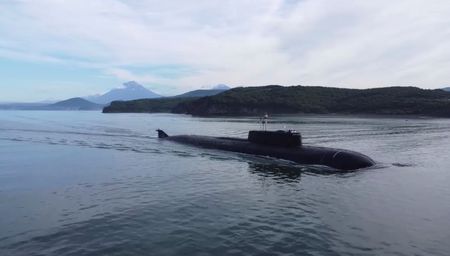
Long Awaited US-Australia Submarine Pact Promises To Be A Windfall For American Defense Contractors: REPORT
Micaela Burrow on March 9, 2023
The U.S. and Australia plan to massively invest in American defense companies amid pressure to accelerate production of long-promised nuclear-powered submarines for Canberra, The Wall Street Journal reported.
President Joe Biden is set to reveal the final arrangements of a plan to provide Australia with five U.S.-made Virginia class attack submarines by the mid-2030s on Monday, according to Reuters. As the main U.S. submarine contractors struggle to keep up with domestic demand, Australia might make a contribution toward shoring up U.S. production capacity as well, the WSJ reported, citing people familiar with the plan.
“The Biden administration has never asked Congress for the type of generational investment of resources, authorities, and political capital in our submarine industrial base to meet our own Navy’s submarine requirements, let alone additional requirements,” Republican Mississippi Sen. Roger Wicker told the WSJ.
The first few of Australia’s new submarines will be produced in the U.S., according to the WSJ, citing the people familiar with the plan. Australia and the United Kingdom will eventually assume full responsibility for building Canberra’s fleet, using a new design that incorporates elements of U.S. technology.
The people also said the plan involves aligning infrastructure and logistics to allow U.S. attack submarines rotational access to Australian ports, according to the WSJ.
Plans to build up U.S. and Australian submarine production capacity are just part of a larger agreement between Washington, Downing Street and Canberra to deepen cooperation on artificial intelligence, autonomous systems, hypersonic missiles and undersea technologies, the people told the WSJ. Known as Aukus, the scheme harnesses U.S. defense and technological expertise to bolster Australian and British submarine fleets.
It emerged out of a growing sense of China’s military threat in the Pacific and could enhance the West’s advantage over China in undersea military capabilities, U.S. officials said, according to the WSJ.
Australia already operates a fleet of diesel-powered conventional submarines, the WSJ reported. However, the nuclear-powered versions can travel further distances and have a stealth advantage.
Australia is considering purchasing up to eight nuclear-powered Virginia submarines, both new ones from scratch and those already operating under the U.S. military.
“I think it is a force multiplier,” Democratic Rep. Joe Courtney, of Connecticut, whose district includes a top submarine supplier owned by General Dynamics, told the WSJ. “Don’t count out the U.S. industrial base to grow and take on more work.”
However, the U.S. industrial base has lagged in fulfilling orders from the U.S. Navy, sparking concern among other lawmakers that the Aukus deal could damage America’s undersea defenses, according to the WSJ. While the Navy budgeted for two new submarines each year, the main manufacturers have produced at a rate of 1.5 annually.
“If the Aukus announcement isn’t matched by a generational investment in our submarine industrial base, it’s nearly pointless,” a congressional aide told the WSJ.
The White House and the Australian Embassy to the U.S. declined to comment to the WSJ.
All content created by the Daily Caller News Foundation, an independent and nonpartisan newswire service, is available without charge to any legitimate news publisher that can provide a large audience. All republished articles must include our logo, our reporter’s byline and their DCNF affiliation. For any questions about our guidelines or partnering with us, please contact [email protected].
